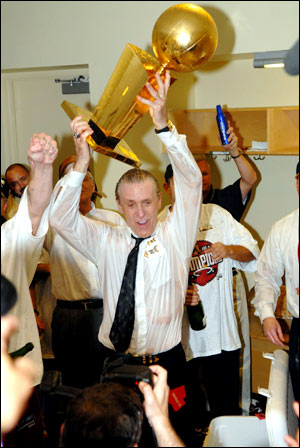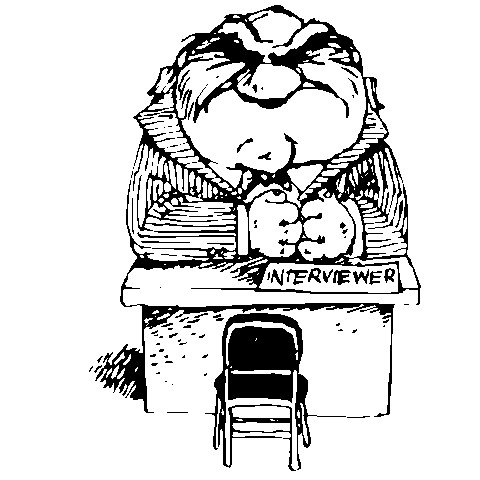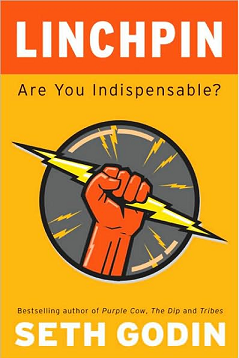Need a doctor, hire a doctor.
Need a lawyer, hire a lawyer.
Need a real estate agent, hire a real estate agent.
Need a dentist, hire a dentist.
Need a computer analyst, hire a computer analyst.
Need a strength coach, hire an assistant football coach, or assistant basketball coach, or an athletic trainer, or a PT, or a the director of operations, or your high school buddy..
Is there something wrong here???
Ray Eady is the Strength and Conditioning Coach at the University of Wisconsin and can be reached at RDE@athletics.wisc.edu
Topics:
Ray Eady,
basketball training programs,
boston hockey summit,
Strength & Conditioning,
boston hockey conference,
Ownership,
Leadership
How do you avoid complacency in a team setting?

RILEY: First of all, you have to realize that complacency is a way of life. You don’t ever avoid it. You have to alert your players to the fact that there are so many things that can get between them and what you are trying to teach them.
You can’t become distracted and let all of these things get into the way and take your mind off of the prize. It’s a deadly disease because it simply gets in the way of your energy and your effort. And when your energy and your effort are down, your efficiency is going to be down.
(Interview questions and answers taken directly from the February 2007 edition of Scholastic Coach & Athletic Director)
Topics:
basketball performance,
basketball resources,
basketball training programs,
athletic training,
Ownership,
Pat Riley,
discipline,
customer service,
development,
Leadership
I have previously mentioned in this blog a team building event that we run for our student staff every year. Though it is a lot of work, it is always a very rewarding experience for everyone involved and in particular the students. Though some of our full-time staff are otherwise occupied and unable to volunteer, we do always have a good number of staff who are willing to give their time for a good cause. One of the keys to the event of course is the formal invitation to student staff that goes out several weeks beforehand so that we can gauge attendance numbers for food, prizes, etc. The collecting of student email addresses from their various supervisors on our full-time staff is always a challenge, but one staff member in particular has proven year after year to be “unable” to provide the email addresses of her students. This year they emailed me five days prior to our event to apologize for not getting back to my inquiry until then and wondered if it would still be possible to include their staff. I promptly returned their email, again requesting just the email addresses for their staff in whatever form was easiest for them. The day before the event their response finally came and it said, “Dear Shaun, I just got time to get to this email. This September has just been too overwhelming. I truly appreciate the offer – maybe next year.” Maybe next year? Now, in all fairness, this person does have upwards of seven students working under them. In the time that it took to send me two emails apologizing for being busy though, don’t you think they could have found the time to send me seven email addresses instead?
What’s our most valuable resource as employees? Yup, you guessed it . . . time. There’s an old saying that goes, “There are only so many hours in the day.” That’s definitely true, but it’s not the time you spend at work or working that matter so much as what you do with those same hours. That’s not to say that quantity is more important than quality (any medical professionals reading this?), but why take the time to send out a two page email to half of your colleagues when a simple phone call to one of them can clear up your issues in a fraction of the time? Why have a meeting with ten people when you really only need three of them to resolve the issues at hand? Are our assistants meant to perform the same tasks as us simultaneously or are they better suited to handle some tasks so that we can focus on others? Think of it this way; if your company hired an independent consultant to come in and evaluate your work habits, would they report back that you were a model of efficiency or someone that would benefit from some additional training?
A former colleague of mine recently posted or perhaps re-posted a tidbit that I found extremely interesting. It said, “If you could only send 10 emails at work tomorrow, I bet those emails would really count for something.” Working on cutting down on email vs. more personal contact (over the phone or in person) is just one area that we can focus on to improve our use of time. This is a point that I harp on again and again, but just because you or your workplace has always done something one way does not mean there is not a more efficient way of doing it. Take some time to evaluate your day to day tasks and ask that imaginary consultant on your shoulder if this is the best (time efficient and of high quality) way to do this.
One of the larger problems however is that some of us look at a clock and see work time as the same whether we are being productive or not. If you fall into that category, then my suggestion is even simpler . . . perhaps it’s time you looked at a new career.
Shaun Bossio is the Assistant Business Manager and ProShop Manager at Boston University FitRec. He can be reached at sbossio@bu.edu
Topics:
Guest Author,
Ownership,
Good to Great,
discipline,
customer service,
development,
Leadership

A friend of mine recently left his job at a major academic institution where he worked his way up from the ground floor into a middle management position before leaving for the upper ranks at a competitor’s on the west coast. As a courtesy to the organization in which he had given so much, and so much given to him, he approached his superior's administrative assistant and asked if there was a formal “exit interview” that he was to partake in prior to his final day at the end of the week.
“Usually only people that want to complain ask for exit interviews,” the administrative assistant explained, “did you still want to speak with him?”
“ummm, well, no, not anymore,” my friend replied.
Wouldn’t an exit interview be the perfect opportunity to gain feedback into your organization’s weaknesses, customer service, and operating procedures?
Sure the employee may be salty that they are leaving, but what chance for feedback do you have otherwise once they’ve walked out the door?
You should search out that employee and simply ask, “what can we do better?” This is the only time they won’t be afraid to tell you exactly how it is. You can sift through the salt and substance after, but once they’re gone, they’re gone, and hence so is the opportunity for your organization to improve.
Art Horne is the Coordinator of Care and Strength & Conditioning Coach for the Men’s Basketball Team at Northeastern University, Boston MA. He can be reached at a.horne@neu.edu.
Topics:
Art Horne,
basketball resources,
Ownership,
Good to Great,
discipline,
customer service,
everything basketball,
development,
managing

At the end of this next semester how will you introduce yourself?
Will your boss know you simply by the name on your driver’s license or as the leader of a new project? The staff nutrition expert? The master coach? The staff liaison to the health center, athletic training room or weight room?
If you want your colleagues and prospective employers to know your name you must be willing to bring your work to the world. You must be willing to rename yourself as "the person who gets things done." If you are not willing, well, that work will simply get outsourced to someone else who is.
Either or, the work will eventually get done.
You might as well have your name on it.
Art Horne is the Coordinator of Care and Strength & Conditioning Coach for the Men’s Basketball Team at Northeastern University, Boston MA. He can be reached at a.horne@neu.edu.
Topics:
Art Horne,
Strength Training,
motivation,
Ownership,
Good to Great,
discipline,
athletic trainer,
managing

We’ve all done this at one time or another; walk into a weight room, watch an athlete train, and know exactly who their strength coach was or what strength coach programmed their training.
Whether you know Tony Testa, Director of Sports Medicine at Seton Hall or not, you’d know exactly which kids he taught the Olympic lifts to and which ones he didn’t. Tony is a perfectionist and a first rate teacher of the Olympic lifts, in fact, probably the best I’ve ever seen. Whether he was helping out in the weight room during training or implementing the clean as part of his rehabilitation program, his athletes are a direct reflection of his affection for the Olympic lifts.
With other strength coaches, its bench press Mondays. 10 sets of Bench… doesn’t matter if you have time for anything else.
“I’ve competed in bench press competitions so you’ll bench too.”
On the flip side, you’ll find other “performance coaches” with little actual training experience avoid weights all together.
“It’s all about flexibility. Feel the stretch”
So what exercises are your athletes performing today, or should I say, which ones are they not doing simply because you don’t perform them yourself? Are you looking to fill in the gaps or just simply looking to fill time?
Art Horne is the Coordinator of Care and Strength & Conditioning Coach for the Men’s Basketball Team at Northeastern University, Boston MA. He can be reached at a.horne@neu.edu.
Topics:
Art Horne,
basketball resources,
Strength & Conditioning,
hockey conference,
Ownership,
development,
Leadership

Do you treat your each patient as if they were your daughter?
Do you listen attentively while taking an injury/illness history as if you were listening to your grandmother? Do you welcome each patient into your treatment room with a smile and thank them for stopping in? Do you call your patients after surgery just to make sure they are doing ok – you know, just the way your mother used to with you?
I remember being an athletic training student at Canisius College when I was challenged by my mentor, Pete Koehneke, to treat every patient as if they were his daughter or a family member.
Boy, did my attention to detail quickly change.
How would the quality of your patient care change if you were treating your daughter/son or better yet your boss’ child?
Would you still be texting on your cell while performing that ultrasound treatment? How about the “advice” of rest and ice you gave the long distance runner without examining them first?
Would that change?
What if that track athlete was a family member? Your sister? Your child?
How would you treat your patient then?
Art Horne is the Coordinator of Care and Strength & Conditioning Coach for the Men’s Basketball Team at Northeastern University, Boston MA. He can be reached at a.horne@neu.edu.
Topics:
Ownership,
Health,
Good to Great,
athletic trainer,
customer service,
evidence based medicine,
Leadership

Is just an excuse for not wanting to do the work required to get a project shipped.
If your boss truly won’t let you, it’s probably because you are asking the wrong questions.
If you want your boss to support you during a project which will ultimately reward you if it works, but punishes the boss if fails then of course you’re asking the wrong questions.
What exactly won’t your boss let you do?
Did you investigate it? Research it? Find a gap in your current operating procedures that is worth filling? Does it fit into your core principles? Values?
If the answer is yes, and your boss really won’t let you, then you might want to find another job where your boss supports the extraordinary work that you’re doing.
Unless of course, your happy with ordinary?
(rant inspired by Seth Godin and his most recent book, Linchpin)
Art Horne is the Coordinator of Care and Strength & Conditioning Coach for the Men’s Basketball Team at Northeastern University, Boston MA. He can be reached at a.horne@neu.edu.
Topics:
basketball conference,
Strength & Conditioning,
Ownership,
discipline,
athletic training books,
customer service,
development,
Seth Godin

In a recent post by Seth Godin he challenges one’s normal approach to problem solving which is usually the “wait to be inspired then act” method and asks us to instead actively seek out inspiration.
Seth states, “Simple example: start a blog and post once a day on how your favorite company can improve its products or its service. Do it every day for a month, one new, actionable idea each and every day. Within a few weeks, you'll notice the change in the way you find, process and ship.”
My challenge to you is to take Seth’s example of blogging, but instead of blogging about your favorite company, write down one new actionable idea each and every day this coming month that will improve your department’s service to your student-athletes. It may be as simple as greeting each athlete or patient with a high five as they enter your office or as complex as a new pre-participation exam that actually screens them for risk factors that matter. Or how about an idea that will provide your staff with more opportunities to ship?
Once you’ve committed to writing down these ideas you’ll not only discover there are a number of easy ways to improve your services, but you’ll actually find yourself leading others to the trough of change.
Warning: you can lead a co-worker to water, but you can’t make them drink. But gosh darn it, seeing you drink first makes it a whole lot easier for others to drink the cool-aid.
Art Horne is the Coordinator of Care and Strength & Conditioning Coach for the Men’s Basketball Team at Northeastern University, Boston MA. He can be reached at a.horne@neu.edu.
Topics:
athletic training,
Strength & Conditioning,
motivation,
Ownership,
Good to Great,
discipline,
customer service,
evidence based medicine,
development,
Leadership,
managing

I don’t know where I first heard this, but it has stuck with me ever since. I probably was complaining about a project, or telling my boss it was too hard to get something done on time.
I was giving him my 2 cents.
What I should have been giving him was my full effort and my full investment of time and energy.
When it comes to delivering projects on time, or shipping, I want the finished project, “show me the money!”
I want a sustainable and impactful change, no barbershop talk, no excuses as to why it can’t be done.
I want your money – not your two cents.
Art Horne is the Coordinator of Care and Strength & Conditioning Coach for the Men’s Basketball Team at Northeastern University, Boston MA. He can be reached at a.horne@neu.edu.
Topics:
athletic training conference,
Strength & Conditioning,
Ownership,
show me the money,
jerry mcguire,
Good to Great,
discipline,
development










